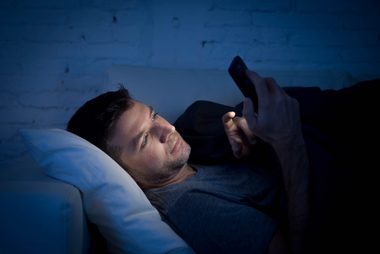
Ban electronics at bedtime
One of the best things you can do to improve your sleep is keep all your gadgets―that includes tablets, TVs, laptops, and yes, even your phone—out of reach and, if possible, out of your room. The blue light produced by screens messes up your internal circadian clock by making your brain alert at a time when it should be asleep, according to a study done by Brigham and Women’s Hospital. This not only leads to insomnia but can hurt your overall health, the researchers say. Instead of using your phone to wind down at night, place all electronics on a charging station in another room and keep a good book handy. (Okay, maybe not too good of a book!)
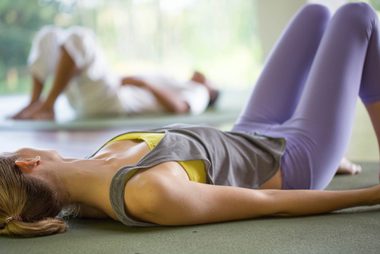
Exercise in the a.m.
Want more sleep success when the lights go off? Make sure you’re getting your sweat on. Exercise is a simple but powerful tool in helping you off to dreamland, according to a study published in the Journal of Clinical Sleep Medicine. But don’t expect it to be an instant fix, says lead researcher Kelly Glazer Baron, PhD, a clinical psychologist and director of the behavioral sleep program Northwestern University’s Feinberg School of Medicine. Hitting the gym that morning won’t necessarily help you sleep better that night; rather it’s the consistency that’s important, she explains. In the study, people who exercised at a moderate intensity (think brisk walking) for at least 30 minutes three to four times a week slept the best.
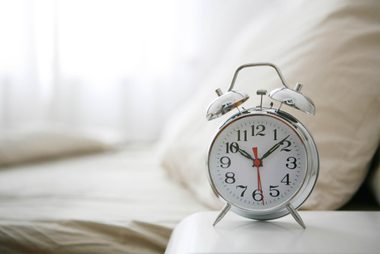
Toss your alarm clock
Waking up to an obnoxious noise blaring in your ear is no one’s idea of a fun time but it’s a necessary evil in our modern times, right? Maybe not. Your body’s circadian rhythms are fine-tuned to regulate both your sleep and wake times. Timing your waking not with an alarm but by the point you are in your REM cycle leads to a much better night’s sleep as well as a more pleasant morning, according to a 2015 study. And it’s not incompatible with your 9 to 5. Figuring out when you need to go to sleep to wake up naturally is as simple as using this sleep time calculator. There are also gadgets that will wake you gently when they sense that you’re ready to rise (try the Sleeptracker Wake Up Monitor).
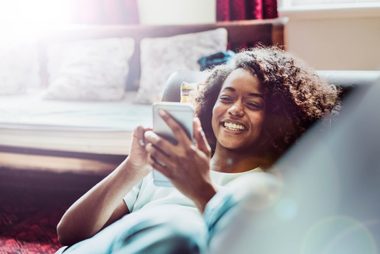
Cut down on smartphone use
Not only is it a sleep sin to snooze with your phone under your pillow, but how much you use it during the day time could also be affecting how well you sleep. The more screen time you log during sunlight hours, the less time you log in the sheets during the nighttime, according to a study published in PLoS One. Even worse, the sleep you do get will be lower quality, the researchers added. Here are more things you can do during the day to boost your sleep at night.

Eat light, healthy meals
Clean eating is intrinsically linked with clean sleeping, so if you’re too wired to sleep at night and too drowsy to function in the daytime, your insomnia might be due in part to what you’re eating. Caffeine and alcohol are known for messing up sleep, but it goes beyond the obvious. Not getting enough dietary fiber during the daytime was linked with lighter, shorter, less restorative, and more disrupted sleep in a study published in the Journal of Clinical Sleep Medicine. And a separate study, done by the University of Adelaide, found that eating meals high in fat not only led to sleep problems at night but it also made people sleepy during daytime hours.
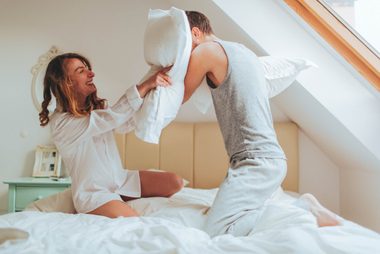
Kiss and makeup before bedtime
There may be a real benefit to the old marriage advice to never go to bed angry. People who feel underappreciated or uncared for by their partners are more likely to suffer from insomnia, according to a study published in Social Personality and Psychological Science Similarly, people who have partners who quickly respond to their needs get more and better sleep. “Our findings show that individuals with responsive partners experience lower anxiety and arousal, which in turn improves their sleep quality,” lead author Emre Selçuk, PhD, a developmental and social psychologist at Middle East Technical University in Turkey told the Society for Personality and Social Psychology.
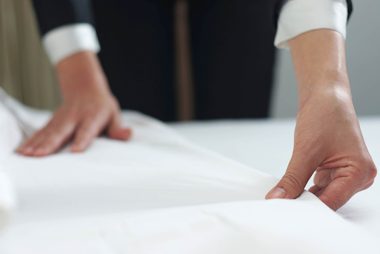
Splurge on a good pillow and quality sheets
Is there anything more delightful than slipping into soft, freshly laundered sheets and laying back on a firm, cool pillow? Taking the time to make sure your bedroom is set up for optimal slumber can go a long way in helping you relax and unwind. Some people find that switching out their pillow makes all the difference. Many insomnia sufferers are getting their best-ever Z’s with the new NIGHT Pillow, an oxygenated memory foam pillow with a black silk pillowcase (that’s also hypoallergenic, antibacterial, and machine washable), because it provides just the right amount of support for any sleep position. And if you’re not a pro at interior decorating, no worries. It’s just about creating the perfect environment for you.
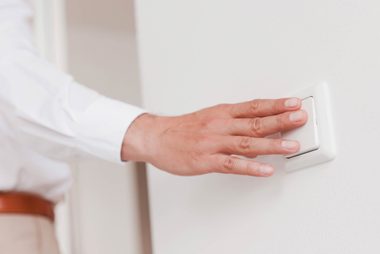
Turn out the lights—all of them
Forget a night light, a bathroom light, or even a lighted alarm clock. Pitch black darkness is ideal for solid sleep, says research done by The Endocrine Society. And your body’s need for less light starts earlier than you think, at dusk. Exposure to electrical lights between dusk and bedtime strongly suppresses your body’s melatonin levels, which leads to a harder time falling asleep and less quality sleep when you do, the study found. Even streetlights can mess you up; so if you find yourself up with the owls, try turning off every source of light in your room and buying a pair of blackout curtains. Not an option? You can always go with a glam, old-school eye mask (try the SLIP silk eye mask). Here’s what we can learn about sleep hygiene from the bedrooms of good sleepers.
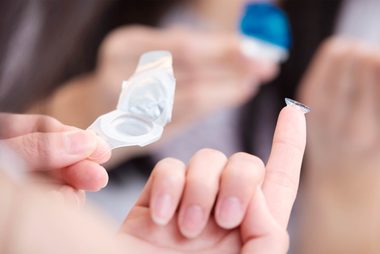
Never sleep in your contacts
Do you ever collapse into bed, too tired to even put on pajamas, much less take your contacts out? Stop it now, says Tanya N. Gill, an optometrist and founder of We Love Eyes. (Well, stop sleeping in your contacts—she has no opinion about your pajamas!) At best sleeping in contacts can make your eyes red and irritated, and, at worst, this bad sleep habit can lead to a serious infection, she explains. (These are other contact lens mistakes to avoid.) Oh, and while you’re standing at the sink, take the extra minute to wash your face, as sleeping in your makeup is harmful to your skin and eyes, she adds. At the very least, drag a makeup-cleansing wipe, like Yes To Cucumbers Facial Towelettes, across your face.
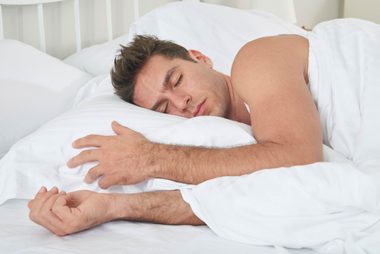
Don’t sleep on your stomach
Changing your default sleep position is like changing the way you tie your shoelaces—it just feels so wrong. But the way you sleep can have a big impact on how you sleep. Sleeping on your side is more effective at clearing out “brain waste” and helps protect you from memory loss and degenerative diseases, according to a study published in Neuroscience. And sleeping on your back will help prevent wrinkles, say our beauty experts. Brains or beauty? It’s up to you, but one thing is clear—don’t sleep on your stomach. (Not to mention previous research has found that stomach sleeping can lead to long-term back and neck problems.) Read more about the best sleep position for your health problems.
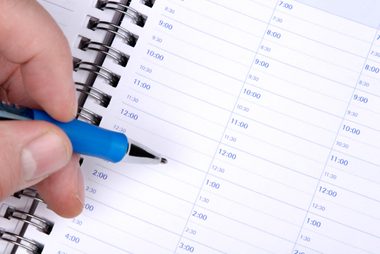
Have a consistent bedtime routine
A warm drink, a good story, and a kiss goodnight aren’t just a sleep recipe for tots. Adults thrive on regular sleep routines as well, according to a study done by Brigham Young University. Setting, and keeping, consistent times for going to bed and waking (even on weekends!) were the key to sleeping like a baby, the researchers found. (Bonus: It also helped the participants lose weight and body fat.) In addition, having a bedtime routine that includes things like reading a book, meditating, praying, and drinking herbal tea can help you relax into dreamland. Your body and mind will learn to recognize and anticipate these sleepy-time cues, leading to a smoother transition to somnolence. These are the secrets to better Z’s that sleep docs want you to know.